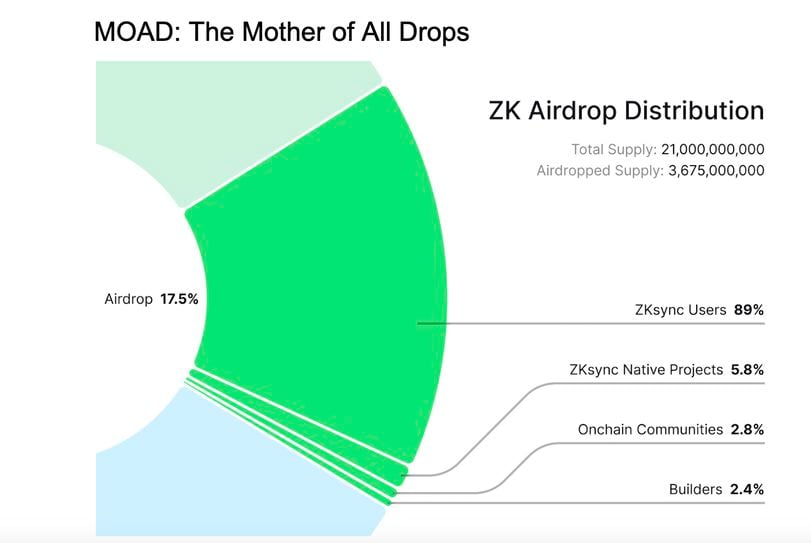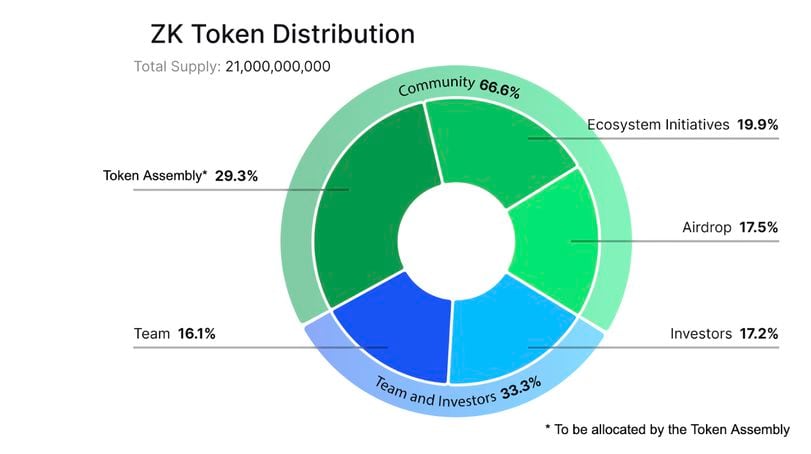Matter Labs, the main development firm behind the layer-2 network ZKsync era, has officially disclosed the distribution criteria for its long-awaited ZK token airdrop. According to the plan released Tuesday, 17.5% of ZK's 21 billion total token supply will be airdropped to users beginning "next week."
Like other layer-2 networks, ZKsync Era pitches itself as a quick and cheap way to send transactions on Ethereum. According to Matter Labs, the ZK airdrop will be the “largest distribution of tokens to users amongst major L2s,” with just under 3.7 billion tokens going to users.
Pre-market prices from Aevo, a crypto perpetuals exchange that currently values ZK at $.66, would place the airdrop's fully diluted value (FDV) above $2.5 billion, which is nearly triple ZKsync Era's current total value locked (TVL) of $815 million .
Under the distribution plan, 89% of the airdrop will go to ZKsync users, a group that includes anyone who has transacted on ZKsync and met a certain threshold of activity (a specific threshold was not provided). The remaining 11% will go towards contributors to the ecosystem, including zkSync native projects (5.8%), on-chain communities (2.8%) and builders (2.4%).
The airdrop news comes as Matter Labs continues to receive backlash from its layer-2 peers over its decision to trademark the term “ZK,” which is shorthand for "zero-knowledge” cryptography, the core technology underlying ZKsync and a plethora of other blockchain projects. After criticism from the crypto community, Matter Labs withdrew its trademark application , which it originally said it pursued to protect its users from similarly-named projects and token tickers.

Matter Labs said that the airdrop will cap the amount that any given address can receive at 100,000 tokens. “By capping whales, the ZK airdrop fairly rewards community members that contribute to ZKsync in different ways,” Matter Labs wrote in a press release seen by CoinDesk. ("Whales" is crypto-speak for especially big-pocketed traders.)
The team also shared that Matter Labs employees will get 16.1% of ZK tokens, and Matter Labs investors 17.2%. Those tokens will be locked for a year and then unlocked over the course of three more years.
The rest of the token supply will go to ZKsync’s new "Token Assembly" (29.3%) as part of its new governance plans laid out on Monday, and various Ecosystem Initiatives (19.9%).

“Awarding more tokens in the airdrop than to the Matter Labs team and investors is more than a symbolic decision for the community," Matter Labs wrote in a statement shared with CoinDesk. "When the ZKsync governance system launches in the coming weeks, the community will have the largest supply of liquid tokens to direct protocol governance upgrades.”
Airdrop politics
The airdrop follows a series of other airdrops, like those from StarkNet and EigenLayer , which outraged some users who expected to receive larger allotments of tokens. In the case of EigenLayer, in particular, some users took issue with the team's decision to strictly bar airdrop claimants from the U.S. and a long list of other countries.
“We have put a lot of thought into the design of the airdrop," Alex Gluchowski, the CEO of Matter Labs, told CoinDesk in an interview. “No matter what you do, some people are going to be disappointed, but we have looked into others," he said.
Among the "key pillars" Gluchowski's team used to inform its distribution plan, "number one" was to "prioritize community heavily," said the Matter Labs CEO.
Gluchowksi mentioned in the interview that “certain jurisdictions are excluded because they are either banned by sanctioned regimes or are just not welcome, unfortunately for crypto projects doing airdrops, so we have to be compliant and respect those laws.” He did not specify what countries would be allowed to claim tokens, and he didn't say what methods ZKsync would use to enforce its region restrictions.
ZK drama
The news of the airdrop criteria follows after Matter Labs found itself in hot water with competitors Polygon and Starkware over its applications to trademark the term “ZK.” Given that ZK technology and the term ZK are used by many teams in the Ethereum ecosystem, the trademark filing was seen as an attempt by Matter Labs to seize ownership over a "public good."
Gluchowski was defiant when he spoke to CoinDesk this week.
“The guys who have accused us registered “STARK” as a trademark,” Gluchowski said, seeming to reference Starkware. (A “STARK” is a type of zero-knowledge proof that was created by Starkware co-founder Eli Ben-Sasson but is now ubiquitous among Ethereum layer-2 teams.)
“I mean what are we talking about? Everyone has registered trademarks for their products, for their tokens, for whatever," Gluchowski continued.
Gluchowski added, though, that they listened to the community and decided to withdraw their trademark application. “We did not want to leave even the slightest impression that we are trying to manipulate the system to our advantage,” he told CoinDesk.
Read more: The Protocol: Another Episode in the Layer-2 Teams Drama


